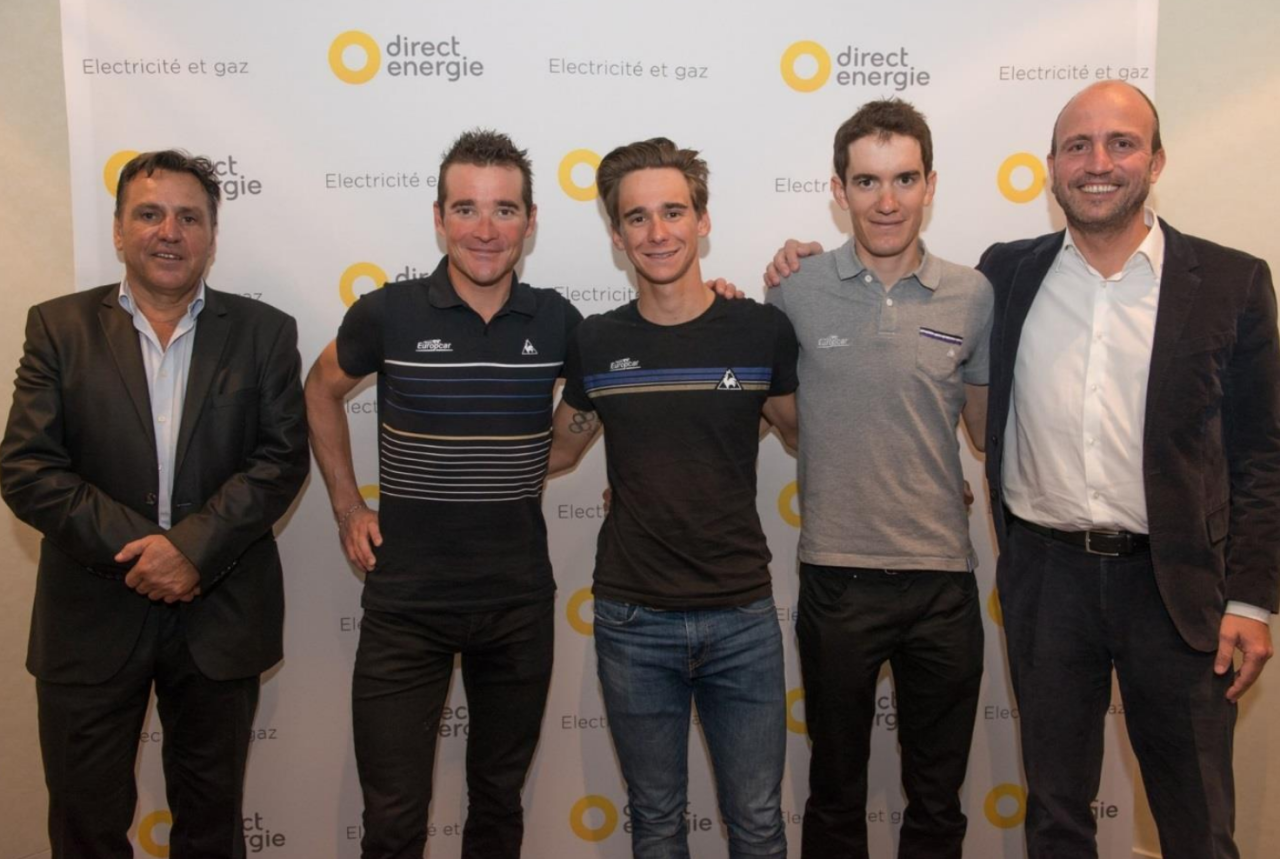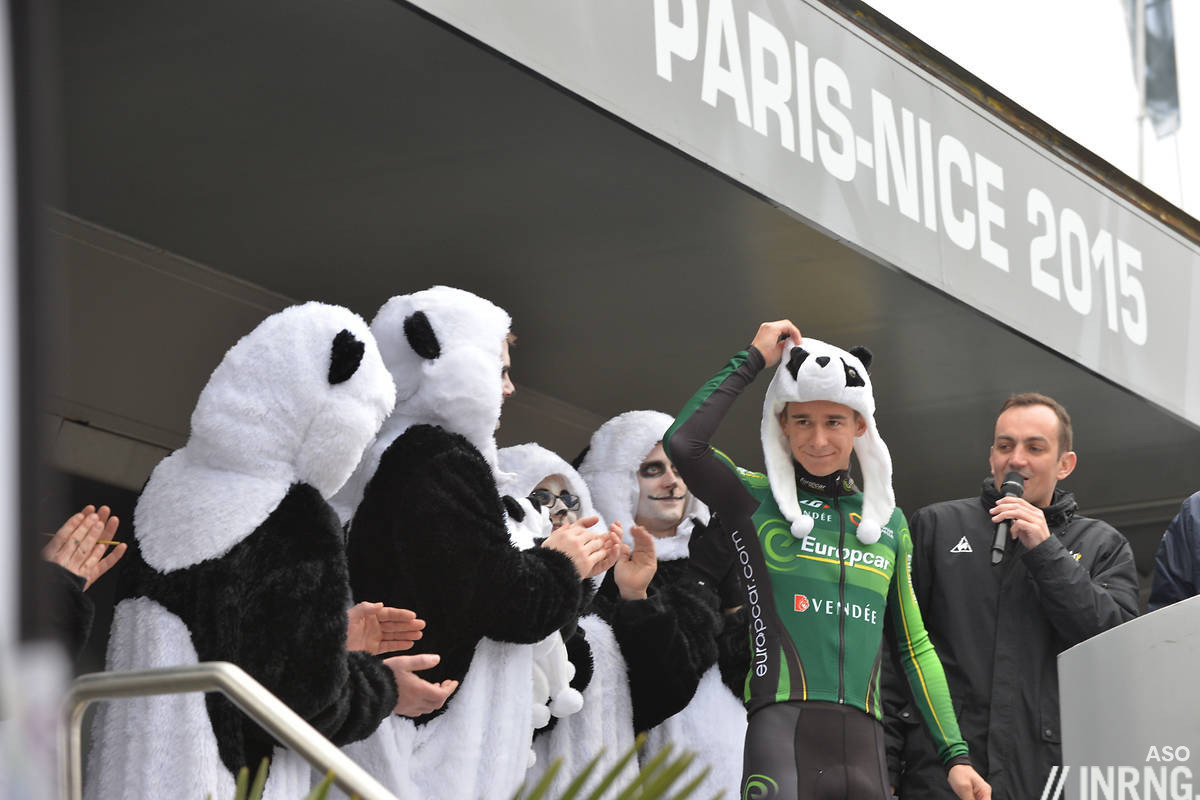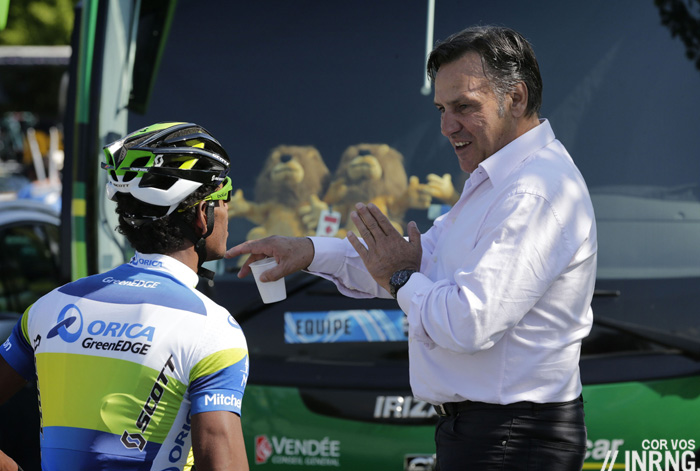Europcar manager Jean-René Bernaudeau has found a replacement sponsor in Direct Energie, a supplier of electricity and natural gas that operates in France and Belgium. It keeps the team on the road and also does the whole sport some good because here’s a sponsor from outside the sport that wants to use the team as a means to win new customers.
Jean-René Bernaudeau seems to be the master of late saves as he’s managed to rustle up a series of sponsorship deals at the eleventh hour. There’s much to cheer with the team’s continued presence but let’s tackle the negatives first:
- This is only a Pro Continental team and there’s talk of 20-22 riders for next year while the existing squad has 26 riders so what continues will be a reduced team
- The budget is mooted to be €6 million, less than half of what Ag2r La Mondiale spends and less than a fifth of Team Sky
- They lose their best rider in Pierre Rolland, 2016 could well be Thomas Voeckler’s last year and he’s not the regular success he used to be, ditto for “new” signing Sylvain Chavanel who returns to Bernadeau’s team after starting out as a neo-pro 15 years ago
- Adrien Petit is a decent signing to help Bryan Coquard’s sprint train but this alone won’t match Cofidis’s lead out train for Bouhanni, yet alone rival Giant-Alpecin and others.
A diminished team and given Europcar are hardly a force at the moment there’s not a huge promise in 2016. So far a downer but the continued presence of the team is a good thing of course, jobs are saved and the mere fact that a new sponsor comes in is good news. Bernaudeau’s team is more than a squad, it’s a family and maybe even a philosophy. This may sound pretentious but that’s how it works at times, the team has its service course in a country manor house and a claimed 85% of the riders come up from the Vendée-U feeder team which is also based there. We can see the loyalty of some riders: Bryan Coquard probably could have gone elsewhere and doubled his salary; Thomas Voeckler has been helping with the sponsorship hunt. It’s not unique, teams like Orica-Greenedge also know they can’t compete financially with other teams so work hard on other aspects to retain their riders and make them feel valued in other ways.

The arrival of Direct Energie is a small coup and possibly good for the sport as a whole in a small way. Look around and the sport is full of bicycle industry sponsors and hobbyist sugardaddies. Great to have them but it says the sport is struggling to find backing beyond the restrictive circle of cycle makers and cycle fans. Direct Energie is a young company that’s been set up as new supplier of energy to challenge the state monopoly providers. We see a similar story with Fortuneo, the replacement sponsor for Bretagne-Séché team, an online bank that needs to attract customers outside from the traditional circle of banks in France. Both Direct Energie and Fortuneo need new clients, sponsorship for them isn’t about making people feel good about an existing brand nor tempting them to make a quick purchase. Instead switching energy supplier or bank is a big ask, a matter of substantial inertia, and it’ll be interesting to see if these two companies find cycling works for them as way to get new customers, possibly rural and provincial ones.

Direct Energie and Fortuneo are also buying in the best route to get the Tour de France publicity bonanza they crave. No need for a World Tour licence and the extra requirements imposed by the UCI. No need to hire 25-30 riders and have riders exhausting themselves in markets where you have no customers like the Giro d’Italia. Instead for a few million Euros these team sponsors are buying a route into Tour de France via the hope of a wildcard awarded because the Tour de France always needs local teams. Direct Energie looks a shoe-in for July.
Direct Energie merged with a company called Poweo in 2012 and the Poweo name lives on in Belgium with the same branding. It’s likely the team has a main jersey and a Poweo version for Belgium. Naming rights are big but not everything. Direct Energie is a sponsor of the team but not the only one, we don’t know if co-sponsor Harmonie Mutuelle will remain but another backer Akena Verandas will. There is also income from other sponsors. Here’s an excerpt from Team Sky’s accounts:

As you can see, title sponsor means Sky and performance sponsorship is all the others like Jaguar, Pinarello and others and it’s a substantial contribution to the team. It’s the same across most other teams. Team managers get the kudos for landing the big deal of the main sponsor with naming rights but there’s a lot more work to do in order to get team cars, bikes, nutrition and other co-sponsors. Colnago won’t be staying as a sponsor, the riders have gone public with criticism of the clover brand.
The smaller the team the harder it gets with the likes of Bernaudeau having to do a lot of the work to land sponsors while also managing riders and all the other jobs; Team Sky have managers dedicated to finding sponsors and working with them, arranging VIP visits and more. Success breeds success and all that.
Conclusion
The team goes on and that’s a good news story. Look more closely and an already weak team is looking weaker for 2016. Better this than nothing. Perhaps the real good news is a sponsor that’s coming in because it sees the sports as means to win over new customers. We see the same with Fortuneo replacing Bretagne too. If it works it may well tempt others to sponsor teams too.


The other good news is that we still get to see Thomas Voeckler (The Housewifes Favourite) on our screens for at least another year, I love his antics, he is the person i would like to have in a break with me the least with his erratic riding and eccentric behaviour! Love him!
Do you still see it being fed with Riders from the Vendee?
Yes, four new neo-pros on their Twitter site today actually.
Great credit to Bernaudeau for pulling this deal off at the 12th hour.
It looks like they will be riding in yellow, white and grey, the corporate colours of Direct Energie.
I wish them the best of luck.
What did they say about Colnago’s bike?
Not so much the bike as the firm. Rolland asked them for wind tunnel sessions for the TT bike but they didn’t do this for him.
I’ll take an old Colnago team bike if no one minds, Ill even pay for the shipping!
The incredible skinniness of pro riders always strikes me when you stand them next to ‘normal’ people, as in the photo above.
Hennie Kuiper was 72 kgs (172cm) when he won on Alpe d’Huez. No one today could dream of being over 70 kgs and a climber, even if they’re Dumoulin’s height.
Have a look at old photos of “normal” people, especially from before the middle of the 20th century.
As “normal” people did less and less physical work as part of their jobs, as it became “normal” to sit on your arse to get to work rather than walk or cycle, and as food became cheaper and cheaper (esp from the 60s onward), so “normal” changed. Those skinny pros would look normal beside many people of the 1930s, e.g.
Note that this new “normal” of today is incredibly bad for our health.
It’s patently obvious that many in today’s society are obese and that this is bad for one’s health.
Also, it’s a known fact that a very low body fat content is bad for one’s health – it adversely affects the immune system amongst other things.
The ‘normal’ people from the 1930s were malnourished: they sufferered from many diseases caused by their poor diet.
yup… don’t confuse “malnourished” with “skinny and healthy”… the people in the 1930’s were about as far from healthy as can be… heck, you don’t have to look far in the world to find really skinny people who are that way because they are starving, not because they are healthy…
too fat = bad…
too skinny = bad…
actually, your body will survive being “fat” far better than it will having a “lack of fat”… once you get down in the 3% body fat range, you can’t stay there for long, it will have severe consequences…
Funny you mention this. I was watching 1982 World Championship (Goodwood, Saronni) the other day and what struck me most was that all the people on the side of the road were ‘normal’ sized.
https://www.youtube.com/watch?v=jjZnpXZ9MP4
Chances are that a lot of them were keen cyclists?
The UK may be even fatter now, but it was pretty fat back then too.
Not even close. Even from 1993 obesity has doubled in the UK, I’m willing to bet 1980 it was under 10%
http://www.hscic.gov.uk/catalogue/PUB16988/obes-phys-acti-diet-eng-2015.pdf
Middle aged manager is fatter than professional athlete, not exactly a surprise, is it?
Great to see the team survive.
Hopefully, once the Armstrong nonsense finally calms down sponsors will come back to the sport.
It’s worth noting there’s been a regime change at the UCI, but with it came more anti-doping secrecy, the opposite of transparency and good governance.
Chances are very good little to nothing has changed to improve the legitimacy of the sport.
Again, that’s not claiming every rider dopes. It means the incentives to boost athletic performance with PEDs and the organization that permits a wide range of doping are still there.
¿”More” secrecy? In what sense. It continued or it increased?
Yes, I’d like to know about the ‘more anti-doping secrecy’ claim as well
Who will be the new bike sponsor?
That’s not clear yet.
Louis Garneau already supplies the clothing and probably a portion of a rider’s salary (Antoine Duchesne). The other Quebec’s bike manufacturer, Argon 18, already supplies bikes for a Pro Continental team. I wouldn’t be suprised that LG widens its sponsorship of the team with the bikes.
Surely they need to put all eggs into one basket named “Tour de France stage victory”. Clearly easier said than done, but I think a model for Direct Energie should be Orica, so rather than building a sprint train for Coquard they should go for opportunists like Gerrans, to get a brief moment and sponsors jersey in the sun.
It’s hard to disagree with anything in the post and a good news story is a good news story.
If the glass were half-empty rather than half-full then rather more could be made of ‘guaranteed’ entry to Le Tour for both Direct Energy and Fortuneo. The French Pro-Continental teams are in a very special place here. Other teams from other countries do not have that massive advantage and selling point.
Yet Bernaudeau can’t keep his sponsors, struggles to replace them, and has taken another cut in budget to keep his team alive. Replacing Europcar with Direct Energy and BSE with Fortuneo does not break the mould of sponsorship by bike companies and hobbyist sugardaddies. And the huge carrot of Le Tour could only attract small, young companies eager for publicity rather than solid, established ones comfortable with a medium-to-long term sponsorship strategy. Those companies still go largely for race sponsorship over team sponsorship.
yes, they go for race sponsorship over team sponsorship…
many people attribute this to sponsors being wary of drug scandals… while i believe there is some truth in that statement, the fact remains that by sponsoring the race, they are guaranteed exposure, whereas by sponsoring an individual team, there is no guarantee…
also, sponsoring races (vs. teams) ensures they hit their demographic target… here in the usa, where we have co-0pted a “poor mans sport” and turned it into a “rich mans sport”*, look at who sponsors the races… and none of the usa races can be confused with “major races”…
* exactly as we have done to soccer…
J-R has a lot of heart. I was very happy when he had announced some time earlier that the team will live on. Thanks for this detailed feature.
Judging by the picture above, the riders’ polo shirts are Le Coq Sportif.
They could be one of the co-sponsors.
could be…
glad we are getting one more season of tommy v… he’s an irritant to the peloton, and every peloton needs a good irritant… 🙂
You say “better than than nothing” in your conclusion. Really? Slow death is still death. I find the view represented in the piece very short termist at a time when long term is what really matters. No one will care in 10-15 years if Europcar (or Direct Energie) ended in 2015, 2016 or 2017.
A lot of teams will lose sponsors and some will go, here is a team that’s been on the road since Chavanel turned pro. If it goes in 2017 or 2018 I think by 2025 people will remember Europcar, Voeckler in yellow in 2011 and other exploits.
I’ll be glad to see a new kit design for 2016. That horrible green Europcar kit was sickening.
I respectfully disagree, anything that is not black is a Good Thing.
I abslutely welcome any colour or combination of colours that departs from the peloton’s black, white and black-and-white. Red kits do stand out but it’s just as uninspired a choice and another red kit would not make it any easier to quickly distinquish between teams.
IMHO Europcar’s green – however horrible it was as a shade of green – was one more reason to like the team and an essential part of road cycling culture – just like Euskaltel’s orange once was.
These are just the corporate designs, a team has to race in a jersey to match its sponsor. Direct Energie is white and yellow so it’ll be interesting to see what they do with the jersey, all white kit with a yellow logo is risky and the yellow has to be handled right not to clash with the yellow jersey.
“the yellow has to be handled right not to clash with the yellow jersey”
Can someone please tell Lotto NL Jumbo? Their jersey colour made it hard to pick out the maillot jaune in the Tour this year, especially on aerial footage.
Pleased to know that the team will continue and I agree with ccotenj that every peloton needs at least one rider like Voeckler 🙂
Agreed. Isn’t there a UCI rule that says teams must be easily distinguishable? If not, there should be. Far too many black kits.
And it’s dull.
As for yellow, not too keen on that either – T-S is OK, but Lotto-Jumbo’s yellow is far too similar to the maillot jaune (actually, L-J’s yellow is more like the traditional yello of the MJ: they should go back to that – and the proper green – the current ones are far too bright/light).
Yes, that’s some bah humbuggery.
Apologies if that last term crosses the no swearing boundary.
It’s always great to see new sponsors come into the sport and nice to see others sticking around. Just for the fun of it, you should pop on over to http://www.akenaverandas.com/thomas-voeckler/ for some cheap entertainment.
While I’m not thrilled that an oil and gas company is the sponsor, it’s better than nothing. This team proves that for at least some folks, it’s NOT all about making big money. It shouldn’t take 20 million a year to fund a decent pro cycling team. I’m starting to wish there was a way to put some sort of tax on the SKY and BMC budgets with a portion to support the less well-funded squads. To me this would make more sense than the Velon idea of trying to take what they believe is a huge pot of gold away from ASO.